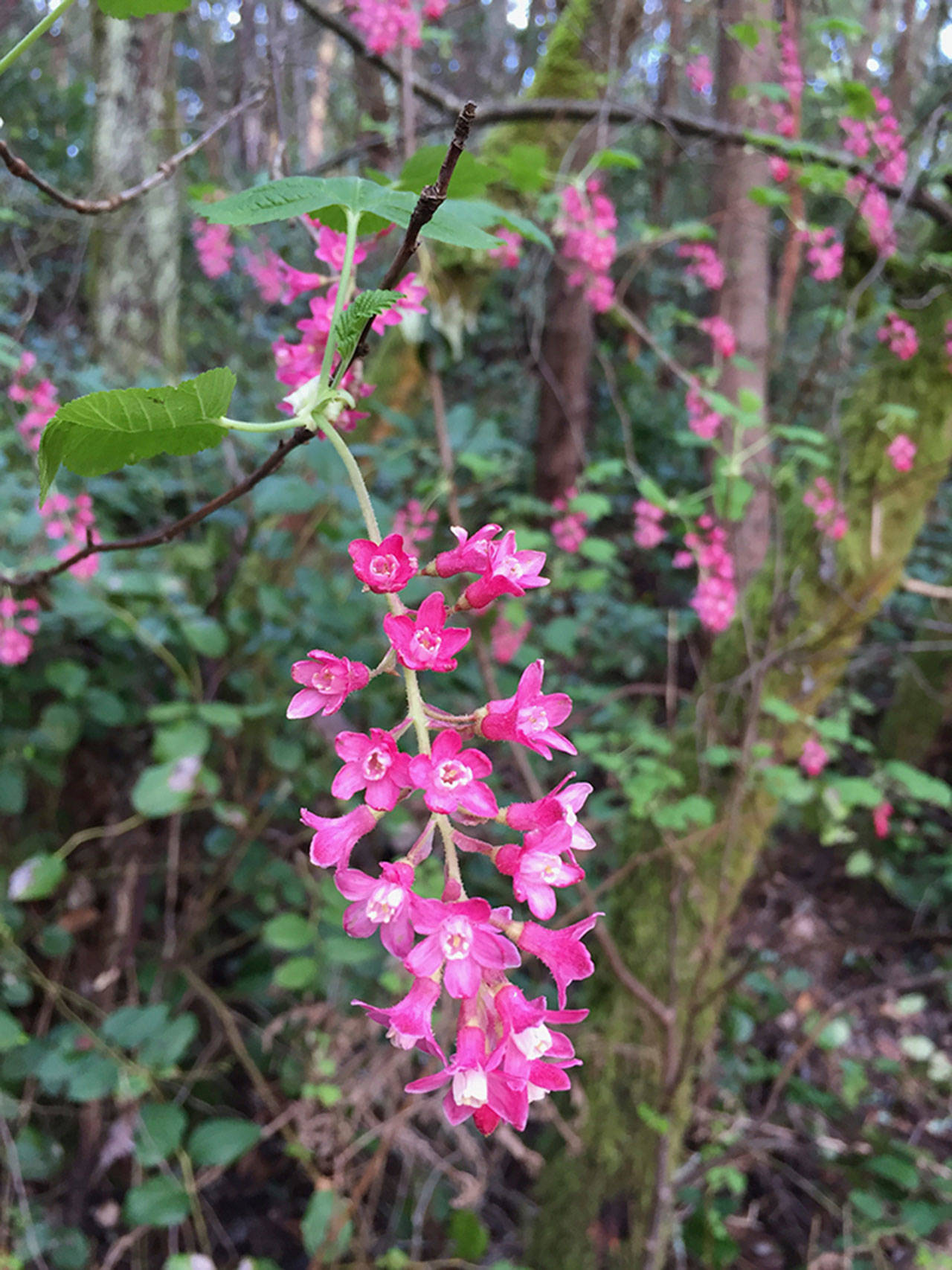By CHRIS WOODS
For The Beachcomber
When Chautauqua Elementary School students returned from their mid-winter break this week, they were introduced to a new old idea: phenology.
Maria Metler, Vashon Nature Center (VNC) education specialist, has installed an exhibit for Chautauqua’s Science in the Halls program to introduce students to phenology, an old idea that has new relevance for science.
Phenology is the study of recurring seasonal stages in nature and plots them on a calendar. Data includes plant bloom times, insect emergence, bird migration and nest building. Each species can have several observable stages called phenophases. For example, a flowering tree or shrub, such as our native red-flowering currant, has a bud stage, a flower stage and fruit or seed stage. These phenophases are triggered by environmental cues: day length, temperature or precipitation. Species survive by timing their phenophases with the environment and other species. This enables flowering plants to avoid frost damage, insect-eating birds to coordinate migration with bug hatches, and plants to bloom when their pollinators are present.
Humans also once relied on phenology to survive. Farmers followed the advice of the “Farmer’s Almanac” to plant corn and beans when oak leaves were the size of a mouse’s ear, or when apple blossoms began to fall.
“It was a more romantic time,” says Metler, “and more connected when we were less wired.”
Climate change studies have made phenology new again as scientists study species that suffer when the timing is off. A caterpillar-eating bird may use day length to time migration and breeding, so that leaf-eating caterpillar populations peak just as baby birds hatch. But warmer spring temperatures may cause trees to leaf out earlier, which de-synchronizes the entire interaction and destabilizes the food web. Scientists say some species may adapt to changing environmental cues over the long run, but those that are already at risk because of habitat loss may not make it.
Citizen scientists can make major contributions to phenology; in some areas they already have.
Meticulous records kept by the Smiley family over 120 years in the Shawangunk Mountains of New York have documented the earlier emergence of plants, amphibians and insects, the early arrival of several migrating birds and the new year-round status of others. This information is being compiled and downloaded into databases such as the National Phenology Network’s Nature’s Notebook.
VNC is waiting for changes to the website’s interface before it plans to launch a community-wide phenology effort, including a workshop to help amateur naturalists record accurate observations and enter their data. Anyone who has kept natural history records on Vashon is encouraged to contact the center at info@vashonnaturecenter.org.
You don’t have to follow formal phenology rules and keep records in order to pay closer attention to nature. Sometimes we just do it naturally. This year, Metler noticed her snow drops bloomed a month earlier because she usually sees them on her son’s birthday.
Metler’s exhibit at Chautauqua includes a map of the phenology trail through the school’s forest, which VNC created with Chautauqua’s science advisor Amy Bogaard, so children can continue to observe and record changes throughout the year. Phenology can help cultivate an awareness of the cycles of nature on a daily walk, commute or even just dropping the kids off at school.
March Events
Thursday, March 1
Vashon Nature Center presents Nature Lounge
Jeff Adams, marine ecologist with Washington Sea Grant and a VNC science advisor, will speak about his green crab research, explain how islanders can get involved in a citizen science project related to this invasive species and offer tips for safe and responsible recreational harvest of crabs, clams and oysters.
7 p.m. to 9 p.m. at the Snapdragon Gallery
Thursday, March 8
Vashon Audubon Talk: The Important Work of SR3: Sealife Response+Rehab+Research.
Veterinary Nurse Casey Mclean will speak about the work of the SR3 organization to protect the marine wildlife of the Pacific Northwest and to build Washington’s first dedicated marine animal rehabilitation and science center. This event is free and open to the public.
7 p.m. at the Land Trust Building
Saturday, March 10
Vashon Audubon Field Trip
Come out for a free, guided bird tour around the island. Bring binoculars or a scope, and wear walking shoes or boots. Children must be accompanied by an adult. Carpools are encouraged and may be arranged at the meet-up location.
Leave from Ober Park-and-Ride at 9 a.m. and return at 11 a.m.
Saturday, March 10
Vashon Supports Honor the Earth
Activist, environmentalist and farmer Winona La Duke headlines a program of music and inspiration to raise money for her organization Honor the Earth currently fighting the construction of a tar sands oil pipeline. Tickets are available at the Vashon Bookshop or online at brownpapertickets.com
Doors open at 6:30 p.m. at Open Space for Arts & Community
Tuesday, March 20
BeachNET Forage Fish Survey
Join Vashon Nature Center to survey local beaches for forage fish eggs.
Contact Maria Metler for more information or to sign up: mariametler.vnc@gmail.com
11:30 a.m.
Monday, March 26 to May 14
Forest Stewardship Coached Planning
Space is still available for Washington State University Extension’s comprehensive, university-based forestry class on Vashon. Participants will learn how to write a forestry plan that may qualify them for property tax reductions or conservation cost-share grants. There is a fee for this class. For more information and to register: http://forestry.wsu.edu/nps/events/cpvashon/
6 p.m. to 9 p.m. Monday evenings at the Land Trust Building
Wednesday, March 28
Vashon Land Trust Annual Meeting
Land Trust Executive Director Tom Dean will give a brief State of the Land Trust presentation. Members will have the opportunity to cast ballots for new Board Members and ask questions.
U.W. Professor of Geomorphology and author David Montgomery will speak about his latest book, “Growing a Revolution: Bringing Our Soil Back to Life.”
All are welcome to attend. The event is free and open to the public.
6:00 pm at the Land Trust building, 10014 SW Bank Road



